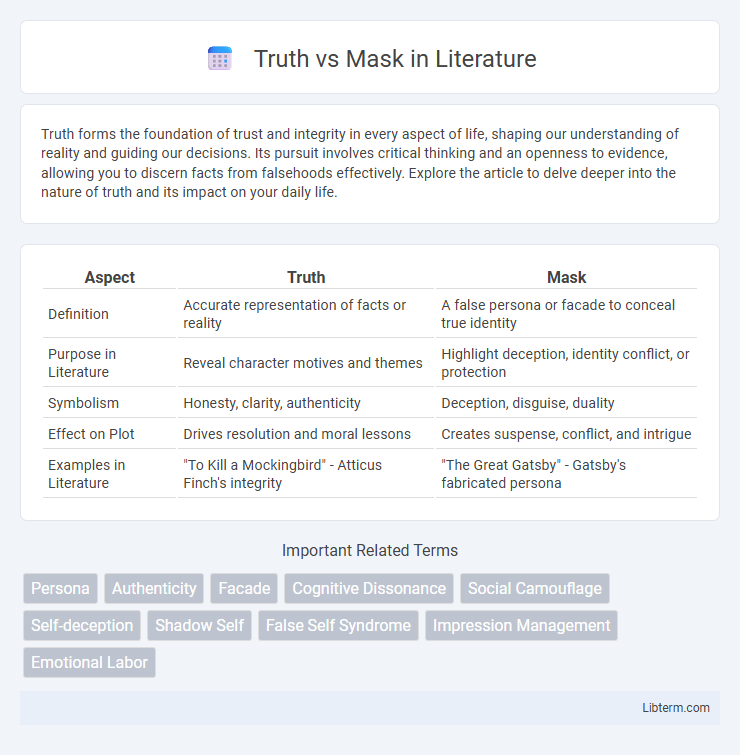Truth forms the foundation of trust and integrity in every aspect of life, shaping our understanding of reality and guiding our decisions. Its pursuit involves critical thinking and an openness to evidence, allowing you to discern facts from falsehoods effectively. Explore the article to delve deeper into the nature of truth and its impact on your daily life.
Table of Comparison
| Aspect | Truth | Mask |
|---|---|---|
| Definition | Accurate representation of facts or reality | A false persona or facade to conceal true identity |
| Purpose in Literature | Reveal character motives and themes | Highlight deception, identity conflict, or protection |
| Symbolism | Honesty, clarity, authenticity | Deception, disguise, duality |
| Effect on Plot | Drives resolution and moral lessons | Creates suspense, conflict, and intrigue |
| Examples in Literature | "To Kill a Mockingbird" - Atticus Finch's integrity | "The Great Gatsby" - Gatsby's fabricated persona |
Understanding the Concept of Truth
Truth represents an objective reality grounded in facts, evidence, and authenticity, while the mask symbolizes a facade or deceptive appearance used to conceal true intentions or feelings. Understanding the concept of truth requires discerning between honest transparency and illusions crafted by social or psychological masks. This distinction is crucial for critical thinking, ethical decision-making, and genuine human connection.
The Origins and Purpose of Masks
Masks trace back to ancient rituals and cultural ceremonies, serving as powerful symbols for identity transformation and spiritual connection. Their primary purpose was to conceal the wearer's true self, enabling participation in sacred rites or theatrical performances while embodying different personas. The act of masking facilitates exploration of hidden truths beneath surface appearances, revealing tensions between authenticity and disguise.
Psychological Effects of Wearing a Mask
Wearing a mask can induce psychological effects such as reduced social interaction cues, leading to feelings of isolation or anxiety. The concealment of facial expressions disrupts nonverbal communication, impairing emotional recognition and empathy. Prolonged mask usage may also cause cognitive strain as individuals exert more effort to interpret social signals and maintain effective communication.
Truth: Vulnerability or Strength?
Truth reveals vulnerability by exposing genuine emotions and imperfections, fostering authentic connections and trust. Embracing truth strengthens resilience, allowing individuals to grow through self-awareness and honesty. Vulnerability in truth transforms perceived weakness into a profound source of inner strength and empowerment.
Societal Expectations: Why We Hide Behind Masks
Societal expectations compel individuals to conceal their authentic selves behind metaphorical masks to gain acceptance and avoid judgment. These masks often reflect cultural norms and social pressures that prioritize conformity over genuine expression. The tension between truth and mask underscores the psychological cost of suppressing identity in favor of societal approval.
The Consequences of Suppressing Truth
Suppressing truth cultivates distrust and erodes authentic relationships, leading to increased psychological stress and emotional isolation. The mask used to hide genuine feelings and realities fosters internal conflict and inhibits personal growth. Over time, this dissonance can result in long-term mental health challenges, including anxiety and depression.
Navigating Authenticity in a Masked World
Navigating authenticity in a masked world requires discerning truth amid layers of deception and social facades. Embracing vulnerability fosters genuine connections while challenging ingrained societal expectations that promote concealment. Prioritizing transparent communication and emotional honesty enhances personal integrity and collective trust in complex social landscapes.
Unmasking: The Journey Toward Self-Acceptance
Unmasking in the journey toward self-acceptance involves acknowledging and embracing authentic emotions and vulnerabilities hidden behind societal and personal masks. This transformative process fosters genuine self-awareness and cultivates emotional resilience by breaking free from fear-driven facades. Embracing truth over pretense empowers individuals to build deeper connections and achieve lasting inner peace.
Balancing Honesty and Social Facades
Balancing honesty and social facades involves navigating the tension between revealing one's true self and adapting to societal expectations. Truth promotes authenticity and trust, while masks often serve as protective layers in social interactions to maintain harmony or avoid judgment. Mastering the balance requires emotional intelligence to discern when transparency fosters connection and when discretion preserves relationships.
Embracing Truth for Personal Growth
Embracing truth fosters personal growth by encouraging self-awareness and authentic decision-making, which strengthens emotional resilience. Facing reality without masks enables individuals to align actions with core values, promoting genuine relationships and increased confidence. This commitment to honesty cultivates a foundation for continuous improvement and meaningful life experiences.
Truth Infographic

 libterm.com
libterm.com